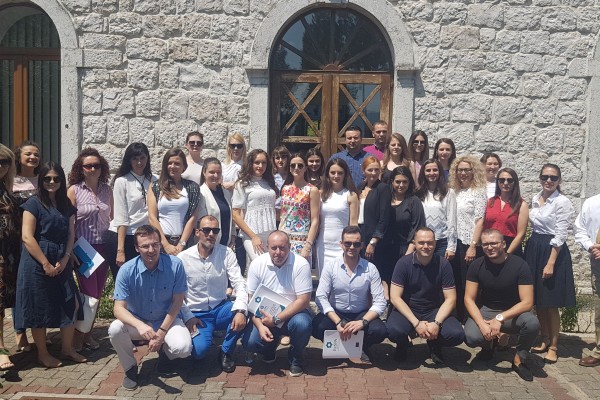
ReSPA Summer School on Accession Negotiations with the European Union Chapters 23 and 24
Danilovgrad, Montenegro, 2-6 July 2018 - The Regional School of Public Administration (ReSPA) held its second, five-day Summer School on Accession Negotiations with the European Union (EU), with a special focus on the Accession Negotiations Chapters 23 (Judiciary and Fundamental Rights), and 24 (Justice, Freedom and Security).
The objectives of the ReSPA Summer School were multiple: to help participants deepen the understanding of the issues covered by Chapters 23 and 24 - background and finer points of the concepts, foreseeable challenges during the Chapters’ negotiations and possible ways to overcome them; to inform participants of the state of affairs in the region in particular thematic areas of Chapters 23 and 24; to derive common lessons from the various experiences, and to share good practices in terms of existing regional initiatives in the matters related to these Chapters.
In her welcome address, Director of ReSPA Ms. Ratka Sekulović emphasized this organisation’s commitment to supporting the Western Balkan governments in reform processes and European integration efforts, mainly by providing a multilateral framework for exchange and cooperation. “Our main focus is public administration reform, which has been defined as one of the three fundamental conditions for the successful integration of the Western Balkans in the EU. So, building better administration that is more professional, more transparent, and more oriented to citizens and businesses actually strongly contributes to the European integration process,” Director Sekulović said.
More than ten speakers at the Summer School were high level professionals and ReSPA experts from Albania, Croatia, Montenegro, Serbia, Romania and the EU institutions. Their main objective was to improve and update participants' knowledge and understanding of the new EU Strategy for the Western Balkans and regional cooperation in the context of the accession process. The themes of the Summer School included the Croatian experiences in accession negotiations, impact of the civil sector on accession negotiations with a focus on Chapters 23 and 24, rule of law in the Western Balkans from the perspective of think tanks, the role of parliaments in promoting the progress regarding Chapters 23 and 24, as well as cross-border cooperation in matters related to the migrant crisis.
Drawing on the first-hand Croatian experience to depict accession negotiations, Dr Vesna Pusić, Vice President of the Institute for Human Sciences in Vienna, and former Minister of Foreign and European Affairs of Croatia explained to the participants in the Summer School that the institutions of the system, more than anything else, need longevity, tenure and stability. “If you have institutions and states that last less than an average human life, being brought down every few decades, you are facing a serious problem. It is very difficult to create something which these institutions must rely on - and that is trust - that people believe that these institutions will be predictable, that they will make transparent decisions and verdicts based on known and equal rules for all. That is what we need, and what we expect. For all of us in this region, European integration gives us a chance to build the institutions that will last, and that will gradually become transparent and trustworthy; that will hopefully create a culture of self-regulation in our societies, supported by institutions that work and perform the tasks we gave them,” Dr Pusić pointed out.
In her expose, Ms. Sabine Zwaenepoel, Co-ordinator of the Centre of Thematic Expertise on Rule of Law and Fundamental Rights, European Commission - DG NEAR reiterated key messages from the EU Strategy for the Western Balkans published in February 2018. “The commitment of the European Commission towards the European future of the Western Balkan region is unequivocal, and for us it is important to stress that in principle the door remains wide open. From our perspective, not only with regard to the region itself but also for the EU as a whole, it is a crucial investment in the geopolitical safety, security and welfare of the entire continent. In the framework of the negotiation process, we open Chapters 23 and 24 among the first – and they will be the last to be closed, in order to leave the countries a maximum amount of time for carrying out these very complex reforms, and for making sure that they result in concrete and sustainable track record, in order to make sure that the overall process is as irreversible as possible,” Ms. Zwaenepoel said.
In a concluding address on transformation of the EU and the prospects for the Western Balkans, Mr. Erwan Fouéré of the Centre for European Policy Studies, a think tank based in Brussels, said that the network of relationships that ReSPA has developed over the recent years has played, and will play a critical role in the future for helping the countries aspiring to join the European Union. „The fact that you have chosen Chapters 23 and 24 as the main theme to guide your work at this Summer School is indeed very timely and very welcome. And, of course, you all know the reasons why these reforms lie at the heart of the accession process: genuine and sustained reforms in these areas will have a beneficial impact on all the other reform areas which each aspiring country is expected to address; and success and achieving those reforms will enable each country to have in place the necessary judicial and administrative capacity to properly apply the EU rules and standards, not only on the statute book but also in practice, and that is the critical aspect,“ said Mr. Fouéré.
The ReSPA Summer School brought together more than 30 senior and middle level professionals actively taking part in the European integration processes, from central EU coordination institutions: ministries in charge for European and foreign affairs, justice, internal affairs, public administration, and from the offices of Chiefs of the SAA/Accession Negotiation Teams.



